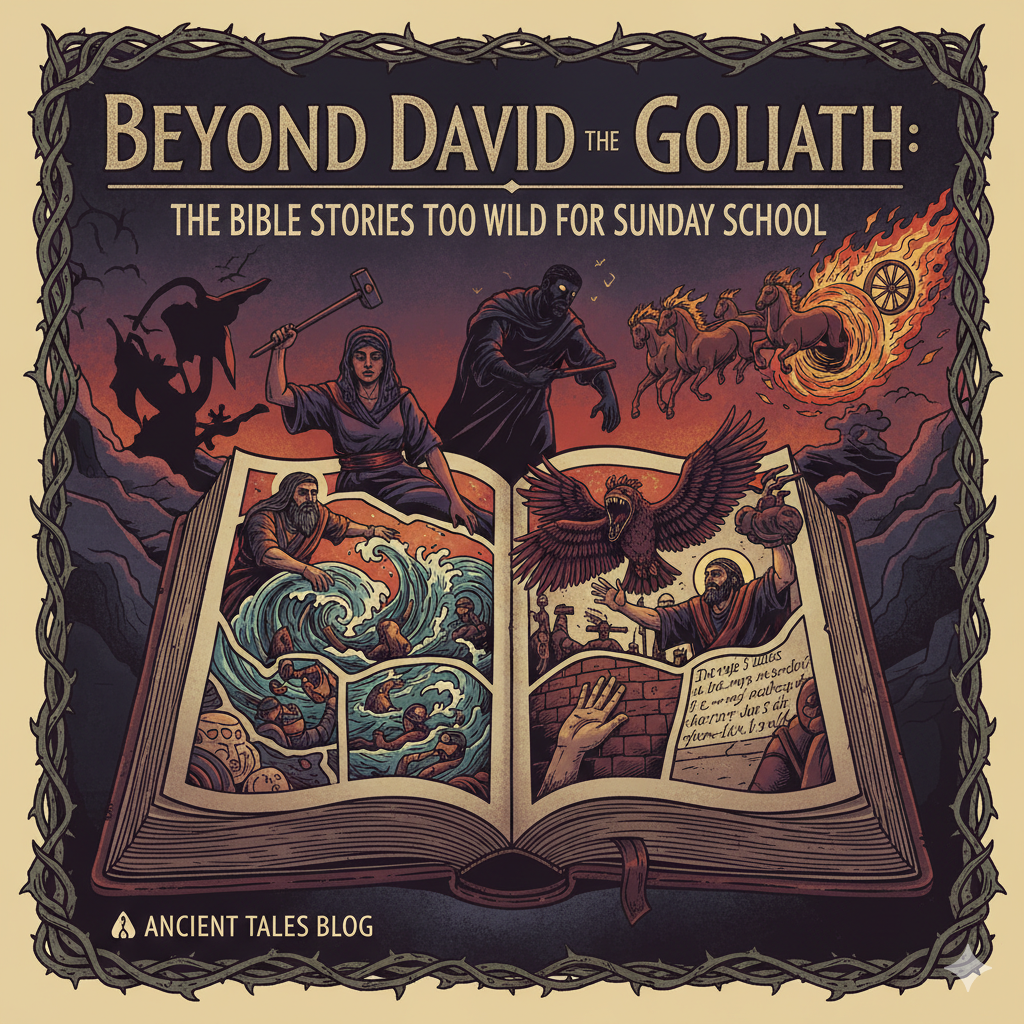Listen to this post: Beyond David and Goliath: The Bible Stories Too Wild for Sunday School
When we think of Bible stories, our minds often go to the classics: Noah’s ark, David and Goliath, Daniel in the lions’ den. These are the comfortable, inspiring narratives that form the bedrock of many sermons and Sunday school lessons. They are powerful, true, and essential.
But Scripture also has harder edges. Tucked away in its pages are stories that are strange, violent, or theologically uncomfortable—narratives that challenge our neat categories and disrupt our expectations. These are the stories we don’t always tell, the ones often skipped in the weekly lectionary. But these raw, unfiltered accounts are also God’s Word. They exist to shatter a simplistic faith and force us to grapple with the difficult realities of sin, sovereignty, and a God who is not tame. They have much to teach us about the complexities of faith, the depths of human brokenness, and the surprising ways God works in the world. This is an exploration of those impactful, forgotten narratives.
1. The Prophet, the Taunts, and the Two Bears
Few stories in the Old Testament stop a reader cold like the one we find in 2 Kings. It begins with a prophet on a journey and ends with a scene of shocking carnage, all because of a schoolyard taunt. Fresh from witnessing his mentor Elijah ascend to heaven in a whirlwind, the prophet Elisha was walking to the town of Bethel.
Along the road, a group of boys from the town emerged and began to jeer at him. Their taunt was simple and cruel: “Get out of here, baldy! Get out of here, baldy!”
Elisha’s response was swift and devastating. He turned, looked directly at them, and called down a curse on them in the name of the Lord. What happened next is the stuff of nightmares.
“He turned around, looked at them and called down a curse on them in the name of the LORD. Then two bears came out of the woods and mauled forty-two of the boys.” (2 Kings 2:24)
This story is deeply unsettling because the punishment feels so wildly disproportionate to the crime. Yet its inclusion in Scripture serves a vital purpose. What does this brutal event tell us about the immense gravity of God’s presence and the role of his prophets as his living representatives? It’s a sobering reminder that sacred authority was not to be trifled with, and that disrespecting God’s messenger carried terrifying consequences in an age when heaven and earth felt dangerously close.
2. The Left-Handed Assassin and the Corpulent King
The book of Judges is filled with tales of deliverance, but none are quite as cunning or gruesome as the story of Ehud. With Israel suffering under the oppressive Moabite king, Eglon, God raises up a most unconventional savior. Ehud is a left-handed man from the tribe of Benjamin—a name that ironically means “son of the right hand.” This small detail becomes the key to his entire plan.
Under the pretense of delivering a tribute, Ehud gains a private audience with King Eglon, who is described as an “extremely fat” man. In the king’s cool upper room, Ehud leans in and declares, “I have a message from God for you.” As the king rises from his seat, Ehud uses his left hand to draw a hidden, double-edged sword from his right thigh and plunges it deep into the king’s belly. The assassination is recounted in visceral detail.
“Even the handle sank in after the blade, and his bowels discharged. Ehud did not pull the sword out, and the fat closed in over it.” (Judges 3:21-22)
Ehud escapes, rallies the Israelites, and leads them to victory. This story, with its blend of dark humor and shocking violence, is rarely a topic for a Sunday morning sermon. It reminds us that God often uses unconventional people and shocking means to achieve deliverance, subverting the enemy’s expectations in the most visceral way imaginable. It is a tale of holy justice served with gruesome, cunning precision.
3. The Mother Who Guarded Her Dead
Rizpah, a concubine of King Saul, is one of the forgotten women of the Bible, yet her story is an unforgettable testament to a mother’s devotion. Her narrative unfolds in a time of political crisis, where a famine was attributed to Saul’s past violence against the Gibeonites.
To appease the Gibeonites, King David agreed to their demand for justice: seven of Saul’s male descendants were to be executed. Among them were Rizpah’s two sons. After they were killed, their bodies were left exposed on a hill, a sign of ultimate shame in the ancient world.
What Rizpah did next was an extraordinary act of defiant love. She took sackcloth, made a shelter for herself on a rock, and began a vigil over the bodies of her sons and Saul’s five grandsons. For about five months, from the start of the harvest until the rains finally came, she stood guard.
“Rizpah daughter of Aiah took sackcloth and spread it out for herself on a rock. From the beginning of the harvest till the rain poured down from the heavens on the bodies, she did not let the birds touch them by day or the wild animals by night.” (2 Samuel 21:10)
Rizpah’s heartbreaking vigil eventually shamed King David into giving the men a proper burial. It is a profound, gut-wrenching picture of a mother’s love that refuses to abandon her children, even in death. It’s an incredible story of grief and honor that is rarely highlighted, even on Mother’s Day.
4. When Divine Grace Feels Deeply Unfair
Not all uncomfortable Bible stories involve violence; some are theologically jarring. The Parable of the Laborers in the Vineyard, told by Jesus in Matthew 20, is one of his most challenging teachings precisely because it offends our human sense of fairness.
Jesus tells of a landowner who hires workers at various times throughout the day. Some are hired at sunrise and toil through the heat. Others are hired at noon, in the late afternoon, and even just one hour before quitting time. When the day ends, the landowner pays everyone the same wage, starting with those who were hired last.
Those who had worked all day were outraged. They felt cheated. The landowner’s response cuts to the heart of a difficult truth about God’s kingdom: grace does not operate on human standards of merit. He confronts their sense of justice with a piercing question.
“Is it not lawful for me to do what I wish with my own things? Or is your eye evil because I am good?”
This parable is often avoided because it directly confronts religious entitlement and pride. It reminds us that salvation is a gift, not a wage we earn. No one deserves more of God’s grace than anyone else—a truth that can be as unsettling as it is liberating. It forces us to ask if we are angry because God is generous.
5. The Day Jesus Compared a Woman to a Dog
An account in Matthew 15 presents a moment so out of character for the compassionate Christ that it is disturbing to read. A Canaanite woman, a Gentile from outside the covenant of Israel, came to Jesus, desperately begging him to heal her demon-possessed daughter.
At first, Jesus simply ignored her. When she persisted, his disciples urged him to send her away. Finally, Jesus acknowledged her, but not with compassion. He met her plea with a shocking insult that drew a sharp line between Israel (“the children”) and Gentiles like her.
“It’s not right to take the children’s bread and toss it to the dogs.”
The woman’s clever and faith-filled response—”Even the dogs eat the crumbs that fall from their master’s table”—ultimately won her the miracle she sought. Jesus praised her great faith and healed her daughter. But the initial interaction remains jarring. Why would the Messiah, the embodiment of compassion, use such a harsh and exclusionary metaphor? The answer reveals something profound about the nature of a faith that refuses to let go. This difficult story challenges us to wrestle with the sometimes-inscrutable methods Jesus used to test and reveal a faith that is relentless.
6. A Night of Unspeakable Brutality
We end with arguably the most brutal and horrific narrative in the entire Bible. The story of the Levite’s concubine in Judges 19 is a stark portrait of a society in complete moral and spiritual freefall, where the guiding principle was “everyone did as they saw fit.”
A Levite and his concubine stopped for the night in the town of Gibeah. A mob of wicked men surrounded the house, demanding the host send out the Levite so they could gang-rape him. In a horrifying echo of Lot in Sodom, the Levite ultimately thrust his concubine out the door to the mob. They abused her all night long, and in the morning, she was found dead on the doorstep. The Levite’s response was equally gruesome. He took her body home, dismembered it into twelve pieces, and sent a piece to each of the twelve tribes of Israel—a shocking call to arms that plunged the nation into a bloody civil war.
It is no surprise this story is almost never preached. It is “strong meat – too strong for most churches.” The Bible includes this horror not to condone it, but as an unflinching diagnosis. It is a terrifying depiction of what happens when a society abandons God and descends into utter depravity—a powerful and necessary warning against moral anarchy.
The Unfiltered Word
The Bible is not always a simple or comfortable book. It is filled with complex, raw, and sometimes strange stories that don’t fit into neat theological boxes. These accounts of violence, moral ambiguity, and challenging teachings are not there by accident. They are woven into the grand narrative of Scripture to tell God’s bigger story.
They reveal the terrifying consequences of sin, the fierce devotion of the forgotten, and the nature of a grace that confounds our human logic. They show us a God who is holy, just, and merciful in unexpected ways. These wild stories are a gift to a mature faith, for they remind us that the God of the Bible is not safe, but he is good.
What might we learn about God, and ourselves, by engaging with the parts of Scripture we’d rather avoid?













